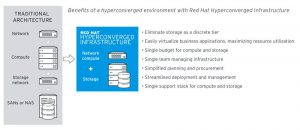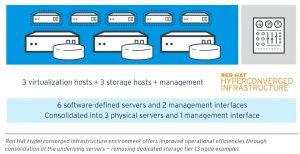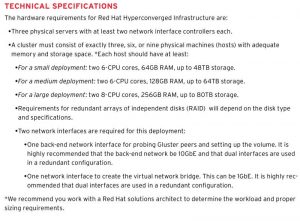Red Hat Introduced Hyperconverged Infrastructure Solution
Software-defined compute and storage platform designed for remote sites and edge deployments
This is a Press Release edited by StorageNewsletter.com on June 26, 2017 at 2:35 pmRed Hat, Inc. introduced Hyperconverged Infrastructure, a production-ready open source hyperconverged infrastructure (HCI) solution.
Click to enlarge
By combining virtualization and storage technologies with a stable, proven operating platform, Hyperconverged Infrastructure is designed to help enterprises to bring datacenter capabilities into locations with limited space, such as branch offices and other remote facilities.
Organizations with distributed operations, such as those in the banking, energy or retail industries, need to be able to offer the same infrastructure services in remote and branch offices as they run in their datacenter. However, they can have challenges: less space and power/cooling, and fewer (or no) technical staff onsite. Organizations in this situation need powerful services, integrated on a single server that can scale out.
Hyperconverged Infrastructure is designed to address these challenges by integrating compute and storage together on a single server, making it a solution for low-footprint remote or branch office installations and edge computing. It is designed to enable organizations to deploy and manage distributed infrastructures centrally, enabling remote locations to benefit from high-performing systems without requiring extensive or highly specialized on-site support staff.
Hyperconverged Infrastructure is a production-ready offering with an open source infrastructure stack and that is developed, sold and supported by a single vendor. An open source, community-based approach helps to avoid the vendor lock in of a proprietary approach and enables customers to take advantage of the innovation emerging from open source communities. By delivering a hyperconverged infrastructure solution with the software-defined components coming from the same vendor, the company is aiming to help customers minimize troubleshooting and support headaches.
Click to enlarge
Hyperconverged Infrastructure uses company’s widely-deployed virtualization platform, as well as software-defined storage, to more efficiently manage an integrated compute and storage infrastructure across a range of server hardware or networks. To accomplish this, Hyperconverged Infrastructure was built with a suite of components, integrated to provide a unified experience from installation to management.
These include:
-
RH Virtualization – The company’s Kernel-based VM (KVM)-powered enterprise virtualization platform.
-
Gluster Storage – High scalable software-defined storage that can be converged on the same hardware as RH Virtualization hosts, removing the need for additional compute infrastructures and simplifying deployment.
-
RH Enterprise Linux – The enterprise Linux platform offers a stable and reliable foundation.
-
Ansible by the firm – Deployment and management built on the simple, powerful, and agentless open source IT automation framework, providing automated installation and configuration from a central point.
Red Hat Hyperconverged Infrastructure is available.
Click to enlarge
Ranga Rangachari, VP and GM, storage, Red Hat, said: “Our customers have been looking for a solution to meet infrastructure needs across their entire organization – not just in the main office – but proprietary solutions previously appeared to be the only viable option for remote and edge installations. With Red Hat Hyperconverged Infrastructure, customers can now provision compute and storage resources for remote sites to run local instances of applications with the same proficiency as in-office operations. Integrating our widely-deployed virtualization technology and our software-defined storage platform gives organizations the confidence of easier procurement, deployment and interoperability, ultimately enabling them to save time and money.“
Terri McClure, senior analyst, Enterprise Strategy Group, said: “The integrated systems market continues to grow with hyperconverged platforms becoming a larger and larger portion therein. Remote and branch office installations can be challenging for enterprises to equip from an IT perspective and are well-suited for hyperconverged offerings. Red Hat’s entry with Red Hat Hyperconverged Infrastructure is a promising start and well timed as more and more customers are looking for a hyperconverged solution which can address their remote site challenges as well as lay the groundwork for software-defined future directions.“
Jong Myung Lee, CEO, FusionData Co Ltd., said: “As a valued regional Red Hat solution partner, FusionData is proud to offer Red Hat-based solutions that help our customers realize key business goals. We engaged Red Hat on a comprehensive evaluation of Red Hat’s hyperconverged solution, Red Hat Hyperconverged Infrastructure; based on the stability and scalability of the solution, we have added Red Hat Hyperconverged Infrastructure as the latest in our set of Red Hat-based solution offerings, and one aimed at addressing the growing interest we’re seeing for unified software infrastructure solutions.“
Matt Tracewell, VP, Tracewell Systems, Inc., said: “At Tracewell we are focused on delivering innovative and efficient technical solutions into a number of key areas in the U.S. Department of Defense. Our success is in large part a product of our partnering with industry leaders focused on customer success. Our teams have a focus on understanding the challenges our customers face and in using technology to meet those challenges. Today we are very excited to be working with Red Hat to address customer needs around a robust, small-footprint software based infrastructure solution aimed at a set of mobile-tactical use cases. To date, we have experienced strong performance and stability with Red Hat Hyperconverged Infrastructure and are excited about using this technology as the basis for our field deployments.“
Resources:
Red Hat Hyperconverged Infrastructure
Red Hat Virtualization
Red Hat Storage
Storage blog















 Subscribe to our free daily newsletter
Subscribe to our free daily newsletter
